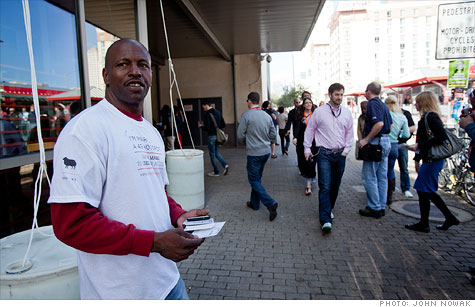
Homeless Austin resident Mark West is working as a 4G mobile hotspot outside SXSW.
AUSTIN, Texas (CNNMoney) -- It sounds like a headline from The Onion, but it's true: A project called "Homeless Hotspots" is turning homeless Austin residents into mobile wireless hotspots outside the South by Southwest convention center.
It's part marketing stunt, part genuine charitable initiative -- and it's generating lots of double-takes and chatter from those who pass by.
"I'm Melvin, a 4G hotspot," reads the T-shirt of participant Melvin Hughes. "SMS HH Melvin to 25827 for access."
Hughes is carrying a Verizon MiFi 4G hotspot. Texting his code sends back his network password, which the recipient can use to suck down a few minutes of fast broadband access -- a scarce commodity at SXSW, a tech/film/music gathering that has drawn more than 20,000 visitors to Austin, Texas.
Access is pay-what-you-want, though $2 per 15 minutes is the suggested donation, payable through Paypal or Venmo. BBH Labs, the project's organizer, says it will pay all the proceeds directly to the participant who made the sale.
Reactions are definitely mixed, Hughes says. He's handed out hundreds of cards explaining the project, and says a few dozen people have actually logged on.
"Some people want nothing to do with it, for whatever reason," he says. "I think it's a great thing. It's an opportunity."
BBH Labs, the experimental wing of global marketing firm BBH, came up with the idea as an attention-grabbing way to draw attention to the issue of homelessness.
Saneel Radia, BBH NY's director of innovation, casts it as a legitimate experiment in entrepreneurship. The company was inspired by the street newspapers sold by homeless residents in dozens of cities and wanted to update the model for the Internet age.
"We're believers that providing a digital service will earn these individuals more money than a print commodity," Radia wrote in a blog post about the project. "We're using SXSW as our beta test. Hopefully you can help us optimize and validate this platform, which we hope to see adopted on a broader scale."
BBH has a history of dabbling in the gray zone between social advocacy and gonzo marketing. A previous project, "Underheard in New York," briefly connected four homeless men in New York with prepaid cell phones and Twitter accounts. The project drew significant press attention, then shut down after a two-month run.
As word of Homeless Hotspots spread, a quick social-media-fueled backlash broke out.
"The digital divide has never hit us over the head with a more blunt display of unselfconscious gall," wrote a ReadWriteWeb reporter. A short New York Times dispatch about the project drew hundreds of disbelieving responses.
Out on the streets, the Homeless Hotspots themselves say they're surprised by the outcry.
"They're giving us the opportunity to work," says Mark West. "You're proving a service for the public. It's like an individual business."
BBH recruited the participants from Austin's Front Steps shelter. Hughes, who has disabling back problems from a herniated disk and is unable to do most physical work, says he was glad to volunteer.
"At my age, most jobs aren't an option," says Hughes, who is 59.
West, a 44-year-old who moved to Austin six months ago from Charlotte, N.C., is an electrician by trade. He says he's pursuing several job leads but found himself homeless as he began rebuilding his life in a new city. With no car, finding stable employment is a challenge, he says.
Homeless Hotspot participants were told that they'll receive their payments in a week or so, Hughes says.
How much has been collected so far? "We're still compiling the data and response," a BBH Labs representative told CNNMoney Monday morning.
West says that for him, the cash is secondary to the chance to interact with the SXSW crowd and potentially change some perceptions.
"I've met people from Australia, Russia, different places," he says. "It's a great thing. They can see it from a different side, my side, instead of just stereotyping the homeless." ![]()